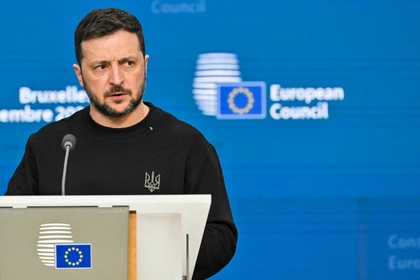Thousands of Georgians gathered outside parliament in Tbilisi on Sunday night, May 12, to protest against a proposed "foreign agent" bill, reminiscent of Russian legislation, aimed at NGOs. Despite government warnings of potential arrests, the demonstration continued.
The bill has sparked weeks of demonstrations in the small Caucasus country. Protesters fear that if passed, the legislation will jeopardize Georgia's longstanding goal of joining the EU.
JOIN US ON TELEGRAM
Follow our coverage of the war on the @Kyivpost_official.
Carrying EU and Georgian flags, demonstrators flooded the main Rustaveli Avenue, hours before parliament was scheduled to debate the bill for the third time. The ruling Georgian Dream party aims to pass the bill this week.
Georgia's pro-EU President Salome Zurabishvili warned protesters to be cautious of "provocations" after reports of activists facing harassment.
The authorities threatened to arrest anyone attempting to block parliament, raising concerns that the protest might be dispersed if it continued through the night.
However, the determined protesters, largely led by the younger generation, remained steadfast in their opposition to the bill becoming law.
"We, as students, don't see a future with this Russian law," 20-year-old Nadezhda Polyakova told AFP, expressing the sentiments of many. "We stand with Europe."
Students from various Tbilisi universities announced a strike, declaring they would not attend lectures starting Monday.

Zelensky Says Trump and EU Must Work Together to Secure Peace
Sunday's protest followed a massive gathering at Tbilisi's Europe Square on the previous day. Despite weeks of protests, the ruling Georgian Dream party seems determined to push through the bill.
Interior Minister Vakhtang Gomelauri warned that blocking parliament could lead to "up to four years in prison," under a law that had previously not been implemented but would now be enforced "without any exemption."
The protests, now in their 35th day, have largely been led by Georgia's young generation, who feel that their country's European aspirations are under threat.
"We are not scared. We are Gen Z, and we are Georgian," said 19-year-old Nino, reflecting the sentiment of resilience among the protesters.
The bill, reintroduced in early April by the Georgian Dream party, has sparked widespread outrage. Critics accuse the government of aligning the country with Moscow's interests and betraying its promise of a European future.
"I feel that we have no choice (but to be here)," Ana Magradze, a 39-year-old doctor, told AFP, expressing her concerns about her children growing up in a country drifting towards Russia's sphere of influence.
The proposed legislation has also mobilized Georgia's large Russian emigre population.
"I am from Russia, I know the consequences of this law," said 38-year-old Ivan, who has lived in Georgia since Russia invaded Ukraine.
His Ukrainian friend, Sergei, added, "I do not want Georgia to turn into another Russia or Belarus."
Protesters have been warned by President Zurabishvili to remain vigilant, with concerns of potential provocations looming large.
"I want to address you (the protesters), so that you know... There are some plans that will not really work, but there are some plans to organize provocations and involve you," she said, urging caution without succumbing to fear.
Authorities had previously dispersed a protest on April 30 using water cannons and tear gas. Leading activists have reported harassment in recent days, with some having their homes and offices plastered with posters reading "foreign agent."
While Georgian Dream has portrayed the bill as a matter of "transparency," the NGO sector, opposition, and protesters argue that its true intent is to stifle dissent and critical voices. They believe the bill is timed to pave the way for an election in the autumn.
You can also highlight the text and press Ctrl + Enter






